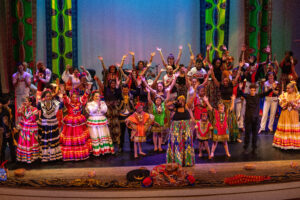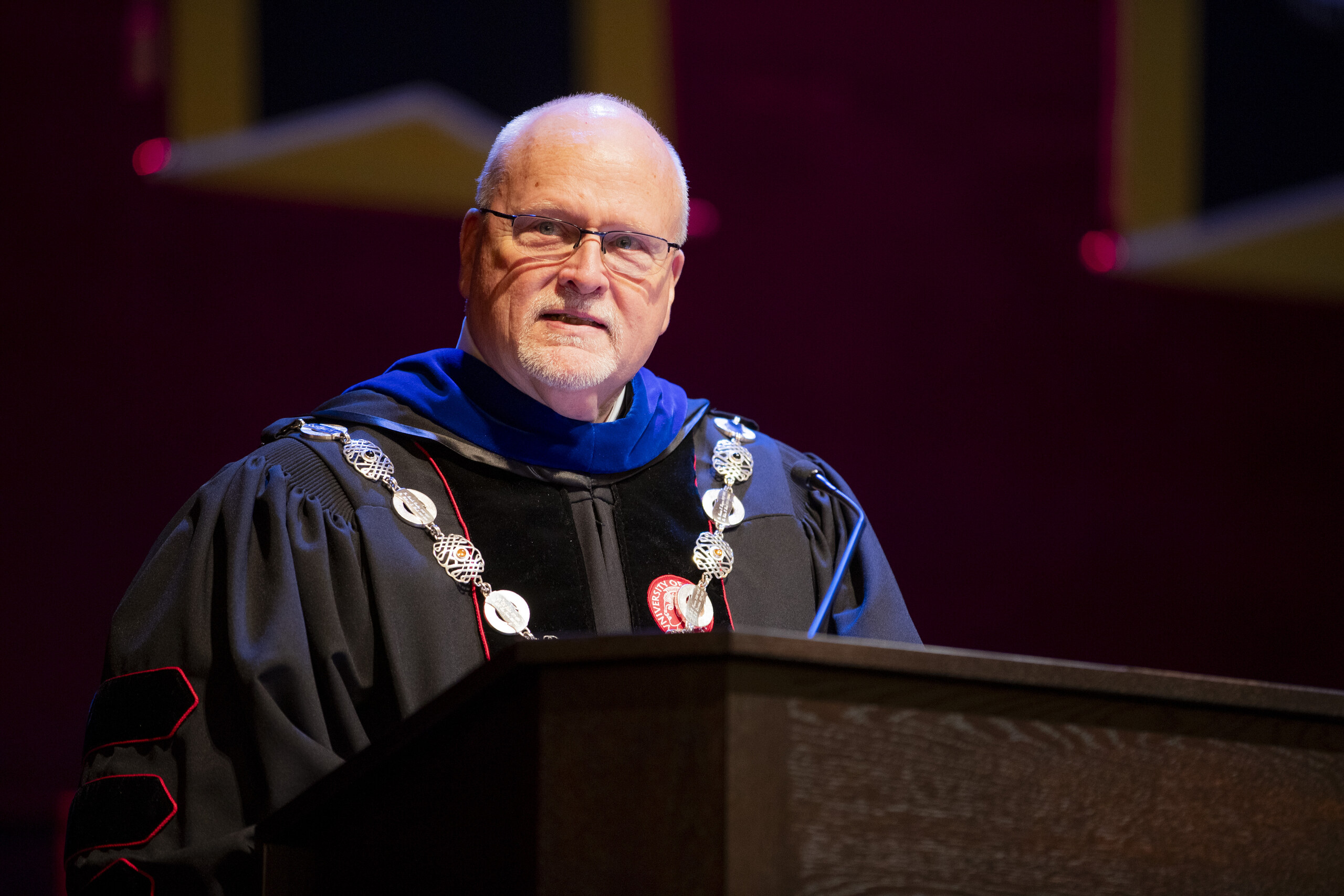
Brenau University could not have opened in 1878 without the support of the Gainesville community. Without the school, the former Mule Camp Springs may have developed quite differently from its origins as a trading post more than 200 years ago. In many ways, the two have grown and flourished together throughout the past 145 years. For David L. Barnett, Ph.D., the 11th president of Brenau, the northeast Georgia community and the university remain strong partners in his vision for a prosperous future for both.
“The importance of community was deeply embedded in me from my earliest years. Community meant spending time together with a group larger than immediate family when working or relaxing,” Barnett says. “These interactions formed me and have anchored my conviction that it is through community engagements across a wide spectrum of groups with varying perspectives that we grow into the best versions of ourselves.”
Community is the foundation of Barnett’s vision for the future of Brenau, ranging from growing degree programs that fulfill the region’s workforce development needs to a campus master plan that prioritizes projects to improve the quality of life for students, faculty, staff, alumni and the region.
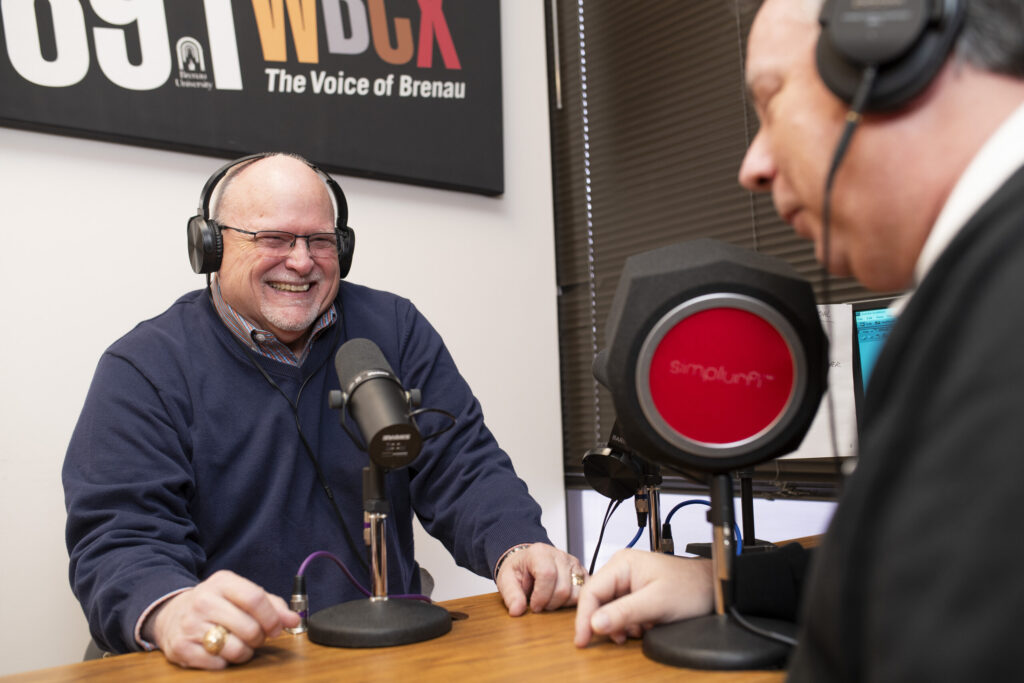
“I’m grateful for the opportunity as Brenau’s president to contribute to the university’s legacy of high-quality education and service to our students and the community,” he says. “Through our pioneering programs in healthcare, education, business, and fine arts, we empower individuals to thrive and help shape the region’s future by tackling its critical economic and professional development needs.”
Over the next several months, Barnett will complete a series of conversations he started earlier this year with students, faculty, staff, trustees and the community; information will be forthcoming as more events are finalized. Barnett will use the input to bring into sharper focus his vision for moving Brenau forward within the structure of the existing strategic plan. Barnett’s vision for the future of Brenau also pushes students to become leaders in their own communities.
“Brenau ignites the minds of future innovators and cultivates transformative leaders in northeast Georgia,” Barnett says. “Our commitment to personalized learning and community engagement fuels a vibrant hub of intellectual exploration and social impact, fostering a generation of changemakers who rise to meet the challenges of tomorrow.”
Changing the world may seem like a lofty goal to assign to college students, but Brenau has been challenging its students to live extraordinary lives of personal and professional fulfillment for more than a century.
“Written more than 100 years ago, the Brenau Ideal espouses being, doing and service for others,” Barnett says. “It proposes a framework for initiating and establishing community. Working in service to others requires continually investing time and energy in doing – active engagement – rather than seeming.”
Preparing for the future
According to the Georgia Department of Labor, healthcare and business dominate the state’s most in-demand career fields – all of which are projected to have hundreds of openings a year through 2030 – requiring a bachelor’s degree or higher. Brenau’s Ivester College of Health Sciences offers degrees through the doctoral level in four listed careers requiring a graduate degree: health specialities teachers; physical therapists; nurse practitioners; and occupational therapists. The college offers a master’s degree in a fifth, physician assistants. The GDOL predicts more than 3,200 job openings each year in those five careers combined.
Brenau also offers degrees that prepare graduates for careers in more than a dozen other high-demand areas such as accounting, art direction, commercial and industrial design, finance, management, human resources, logistics, marketing, nursing, social and community service managers and writing. Those fields will need a combined 32,270 employees each year throughout the next decade. The highest level of projected growth is in general and operations managers, with 8,060 annual openings, followed closely by registered nurses with 5,470 openings projected each year.
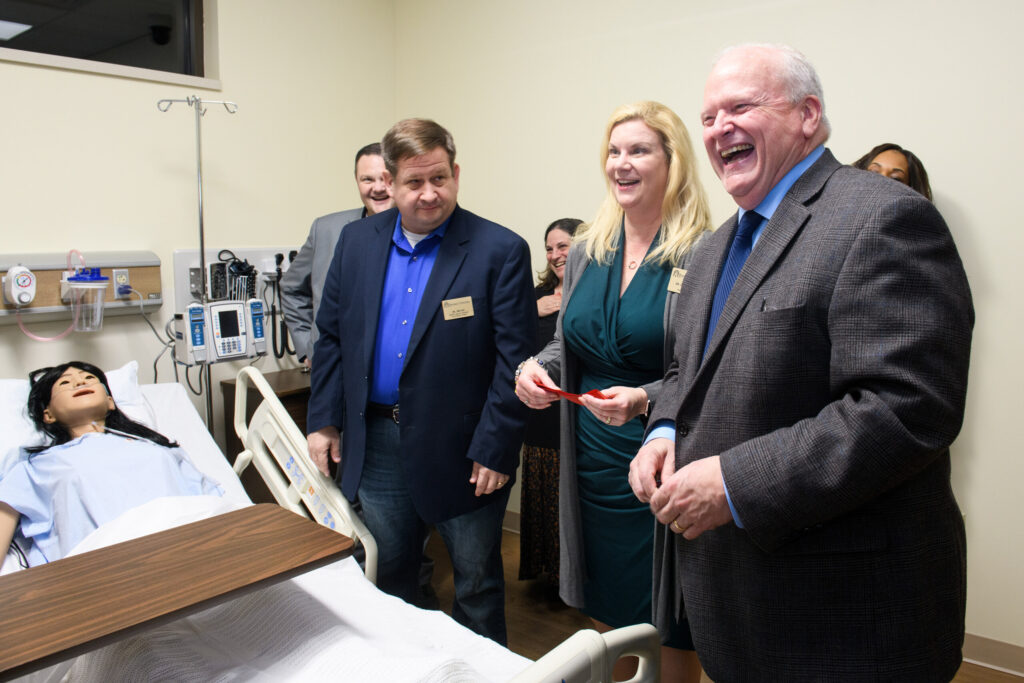
Brenau’s degree programs in healthcare and business as well as education, humanities and the arts provides a holistic education through the university’s liberal arts model.
“Brenau uses liberal arts to ground intellectual pursuits within a context of wholeness,” Barnett says. “The liberal arts context challenges students to develop the qualities necessary for creative inquiry and enlightened thought, which seeks meaning through artistic expression, truth through scientific inquiry, and understanding from global conversations. This perspective elevates merely the transmission of information from faculty to students by encouraging the additional exploration of attitudes, values and passion.”
He is working alongside Jim Eck, Ph.D., provost and vice president of academic affairs to ensure Brenau’s faculty develop courses and degree programs that fulfill those needs while also serving student needs.
“Even before they enter high school, students are encouraged to consider high demand careers, and we want to help them understand the wide number of degrees Brenau offers in those fields,” Barnett says.
“I’ve asked our faculty to think strategically about the degrees they would add to their programs to meet future employment needs, and to remain current on the real-world application of their fields of expertise by practicing their disciplines in and out of the classroom.”
“I’m grateful for the opportunity as Brenau’s president to contribute to the university’s legacy of high-quality education and service to our students and the community.”
David L. Barnett
Brenau University President
Barnett also understands the unique needs of adult college students, who, according to a study from the Lumina Foundation and the American Institutes for Research, often return to college for career advancement. He came to Brenau in 2005 to serve as director of the North Atlanta Campus, a role that involved overseeing daily operations for a campus primarily serving students older than 21. In his first seven years, he helped expand online programs across all four Brenau colleges. Brenau maintains industry and governmental partnerships across the region to determine workforce needs and collaborates with educators from elementary to post-secondary levels to fulfill those needs. Examples of these partnerships include an internship program with the Gainesville Police Department for first responder mental health counselors and credit transfer agreements with technical schools.
Lanier Technical College President Tim McDonald, also a Brenau alumnus, lauded the partnerships after he and Barnett signed an agreement in October related to healthcare administration.
“What we want is the same thing that Brenau University wants: We want better opportunities for the citizens that we serve,” McDonald said.
Building the future
Brenau also has partnered with city leaders and private developers to introduce higher education on Gainesville’s downtown square – to the benefit of all involved in the projects.
“As Gainesville’s premiere institution of higher learning, Brenau worked with the city in the early 2000s to turn a former event venue into a hub for healthcare programs,” Barnett says. “The addition of the Gainesville Renaissance, which houses Brenau’s Lynn J. Darby School of Psychology and Adolescent Counseling, kicked off a revitalization of the Gainesville square into a vibrant place to learn, live, shop, dine and enjoy cultural events.”
The downtown expansion was a transformative project that was years in the making. In 2023, Barnett began working on a new Campus Master Plan with CPL Architecture, Engineering and Planning; the plan outlines Brenau’s facilities needs for the next decade. He started the planning in his former role as Brenau’s executive vice president and chief financial officer, and continued to facilitate the process after he was selected to oversee the university during the late President Anne A. Skleder’s illness.
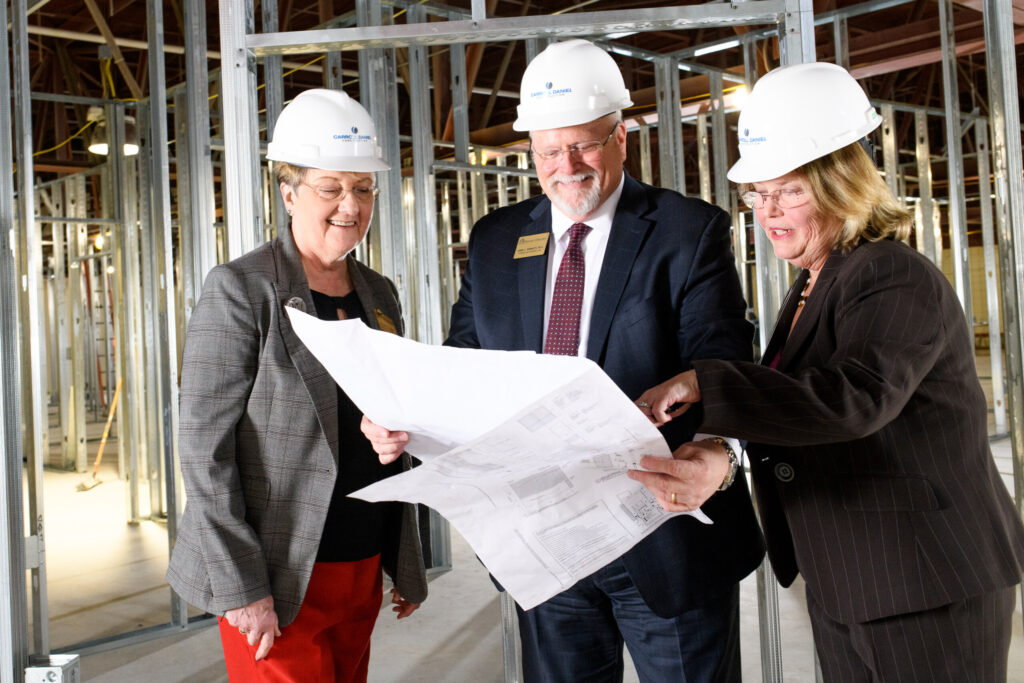
Brenau’s planning committee met with county and city officials to determine the needs of the local community, and how Brenau can continue to be a force in the ongoing economic development of the community it serves.
The plan is still being finalized and more details will be forthcoming when the plan is unveiled.
One thing is certain, it will include transformative projects for Brenau’s campuses and the community that improve the quality of life for students, faculty, staff and the community.
Leaning into Brenau’s legacy
Infused across the entirety of Barnett’s vision is a focus on the university’s historic foundation as a women’s college. Brenau marks its 145th year of educating women as one of fewer than three dozen schools listed on the Women’s College Coalition website. Like Brenau, many of those institutions have broad university programs that are co-educational while retaining a single-gender college exclusive to women.
Studies demonstrate that women tend to do better academically in single-gender schools, develop more egalitarian attitudes about the role of women in society, and increase their leadership qualities at higher rates. Not only are women’s college graduates more likely to continue their education, the Women’s College Coalition notes they are almost twice as likely to complete a graduate degree as a public university alumna.
Barnett says these factors make retaining single-gender education as part of a co-educational institution an essential investment.
“The importance of women’s college education and voice in Southern culture cannot be overstated. Creating and maintaining a learning environment where women’s voices inform intellectual and ethical dialogue is essential for the modern world. Maintaining that opportunity within the context of a larger university is worth the investments necessary to ensure it thrives,” Barnett says. “Equally important is the larger university serving undergraduate and graduate students, providing the opportunity to be participants in the university mission.”
Barnett’s deep belief in Brenau’s mission was lauded by Mike Smith, chair of Brenau’s Board of Trustees, when he announced Barnett’s presidency in February.
“The Board of Trustees has full confidence in President Barnett’s ability to lead the university, its mission and its strategic plan. Having served in various roles at Brenau for 18 years, no one knows this institution better – including the best ways to keep us moving forward – than David Barnett,” Board Chair Mike Smith said in an email to the university community.
“As Brenau celebrates its 145th year, we appreciate President Barnett’s dedication to the university and the leadership he provides as we continue our shared vision for the future.” Being a university president is a goal Barnett says he has aspired to throughout his professional career, but Brenau is the institution that fits best with his personal values and beliefs. There was a time in graduate school when he doubted his plans, but the words of a mentor set a path that Barnett hasn’t wavered from since.
“My personal mental wrestling match resolved with an assurance that a meaningful and fulfilling life with purpose existed in the university setting,” Barnett says. “In a letter penned to close family members soon after finding resolution, I wrote that I became aware I wanted to do something that would make this world a better place. … Being an educator, leading young people to understand the meaning of being created equal and living in community became my ultimate concern in life.”
Barnett earned both a Ph.D. in educational leadership and organizational development and a Specialist in Education from the University of Louisville. He also earned a Master of Divinity from Southern Baptist Theological Seminary and a Bachelor of Arts from Mercer University.
He teaches doctoral courses at Brenau and serves as chair for doctoral students’ dissertations. He has presented at numerous national and regional professional conferences. Barnett is on the boards of the Southern Association of Colleges and Schools Commission on Colleges, Lake Lanier Olympic Park Foundation, Quinlan Visual Arts Center, Georgia Independent Colleges Association and the Atlanta Regional Council for Higher Education.
Barnett and his wife, Kimberly, have a daughter, son-in-law, son and grandson; his wife and son both are Brenau alumni. He is an active member in a local church and participates in civic activities. He is an avid sports fan, a voracious reader, and enjoys various outdoor activities.
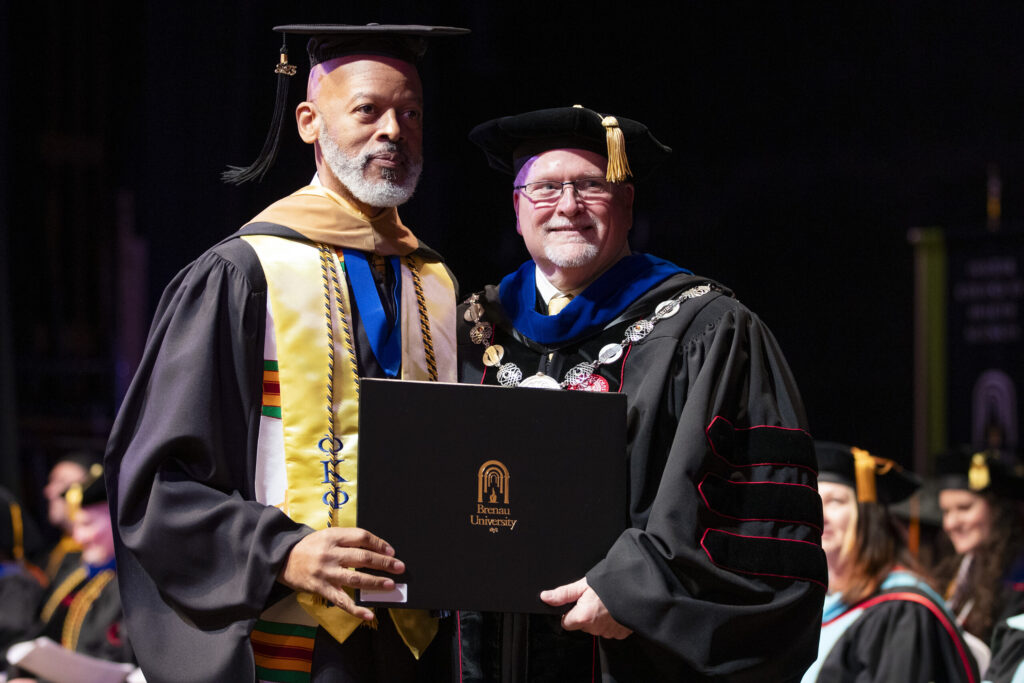
This story originally appeared in the spring 2024 edition of the Brenau Window.

